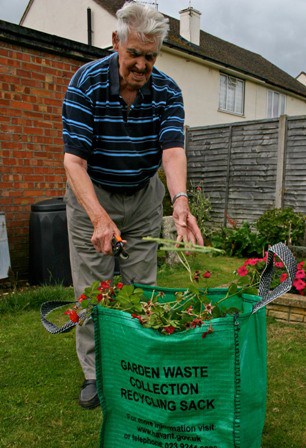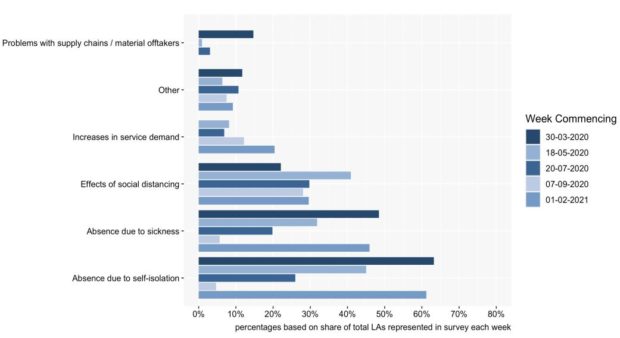The results are based on a voluntary sample of councils taken in the week commencing 1 February. They show that 80% of residual waste services are operating as normal, down 10% from the last survey conducted in September (see letsrecycle.com story).
Three quarters (75%) of recycling services are operating as normal, down from 77% in September, with 15% facing minor disruption and a further 10% facing moderate disruption.

Steve Palfrey, chair of ADEPT’s Waste Group, said: “Although Covid infection rates were very high in early February, the impact on waste services seems to be comparable to June 2020, when case rates were much lower, reflecting the effective measures councils and contractors have put in place to minimise infection risks to staff and service users.
“Most core collection services are now operating normally, with 92% reporting normal services for residual waste and 82% for recycling.
“I want to thank officers for taking the time to respond to the survey and, of course, our teams who are working so hard to maintain these critical services.”
Collections
A “significant” drop was seen in the number of councils operating a normal food waste collection service, with 40% now reporting some form of disruption, compared with just 9% in September.
Almost a third (30%) of authorities report minor disruption, up from 2% in the week commencing 7 September 2020. Just 4% of responding authorities report their food collection services to be currently unavailable, down from 7% in the first survey held the week commencing 30 March 2020, but up from 2% in the week commencing 7 September 2020.

Garden waste has also seen rising levels of disruption since the last set of figures, with 69% of garden waste collection services reported to be operating as normal in the week commencing 1 February 2021, down compared to the 89% reporting in the last survey.
Of the remainder, two in 10 (21%) authorities report a minor level of disruption to services in place. A small percentage (3%) report their garden waste collection services to be unavailable, up from 0% in the week commencing 7 September 2020, but down from 38% when reporting began in the week commencing 30 March.
The majority (80%) of fly-tipping clearance collections are reported to be operating as normal in the week commencing 1 February 2021, down from 92% in the week commencing 7 September 2020.
For bulky collections, 73% report them to be operating as normal in the week commencing 1 February 2021. This is down from 79% in the week commencing 7 September 2020.
Isolation
In the week commencing 1 February 2021, the greatest reported cause for disruption to collection services are the effects of self-isolation. This is identified by 61% of responding authorities providing waste collection services. This is a significant increase from 5% in the previous survey week commencing 7 September 2020.

Disposal
In terms of disposal services, nearly all landfill and energy from waste (EfW) services are operating normally, at 97% and 95% respectively.
This is down from 100% and 96% from the last figures in September.
Material recycling facilities (MRFs) have seen a rising level of disruption, with just 86% operating as normal, compared with 94% in the last figures.
Household waste and recycling centres (HWRCs) continue to see the highest level of disruption, with just 47% of respondents reporting services to be running as normal, down from 50% in September.
Staff absence
In the week commencing 1 February 2021, 21% of responding authorities report experiencing ‘no impact’ on operational staffing levels.
This figure has fallen greatly since the last survey (week commencing 7 September), when 63% experienced ‘no impact’. The level of disruption, however, is still less than experienced in March 2020, when only 5% reported no impact.











Subscribe for free